Charles E W Bean, Diaries, AWM38 3DRL 606/260/1 - 1916 - 1930 - Part 11
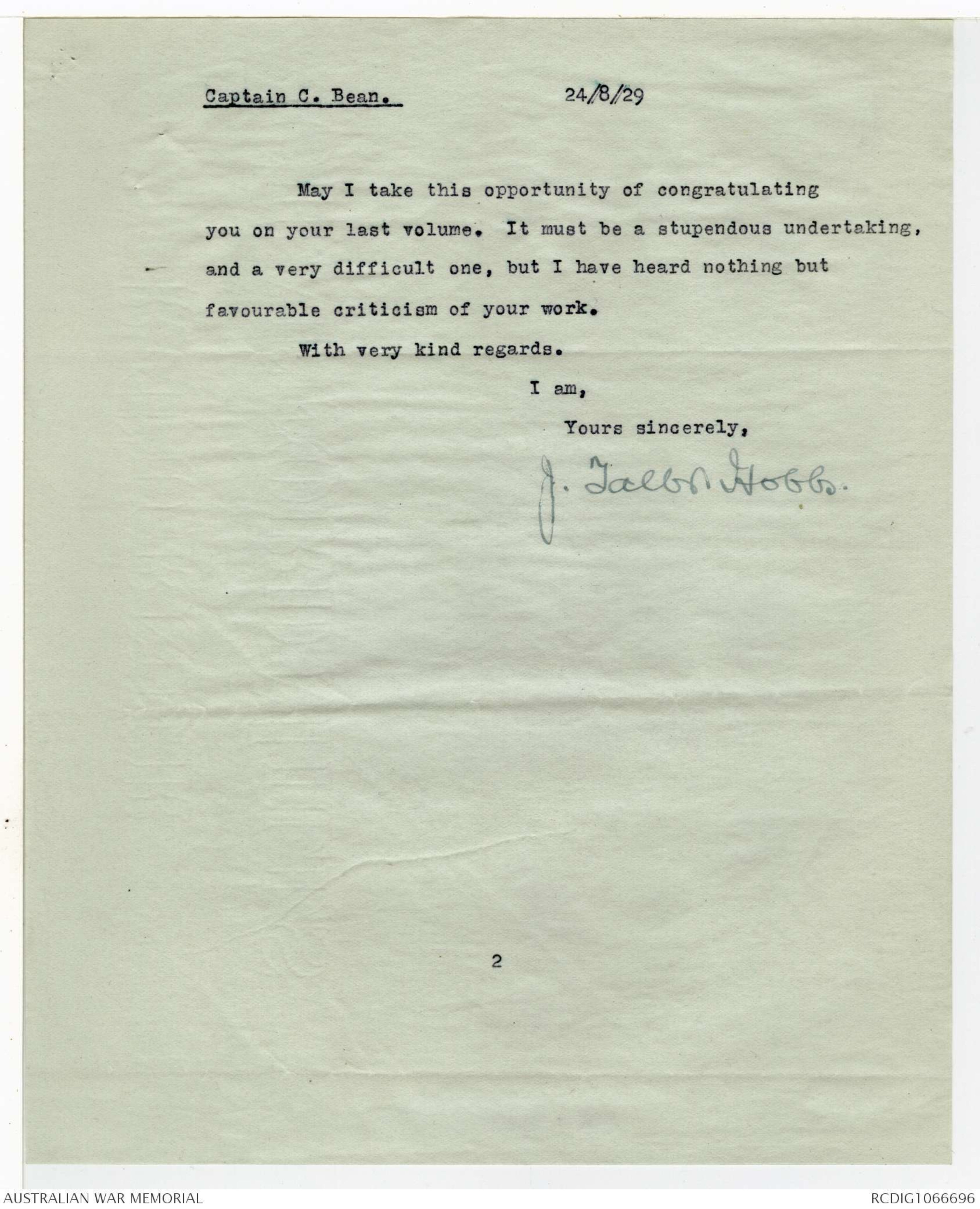
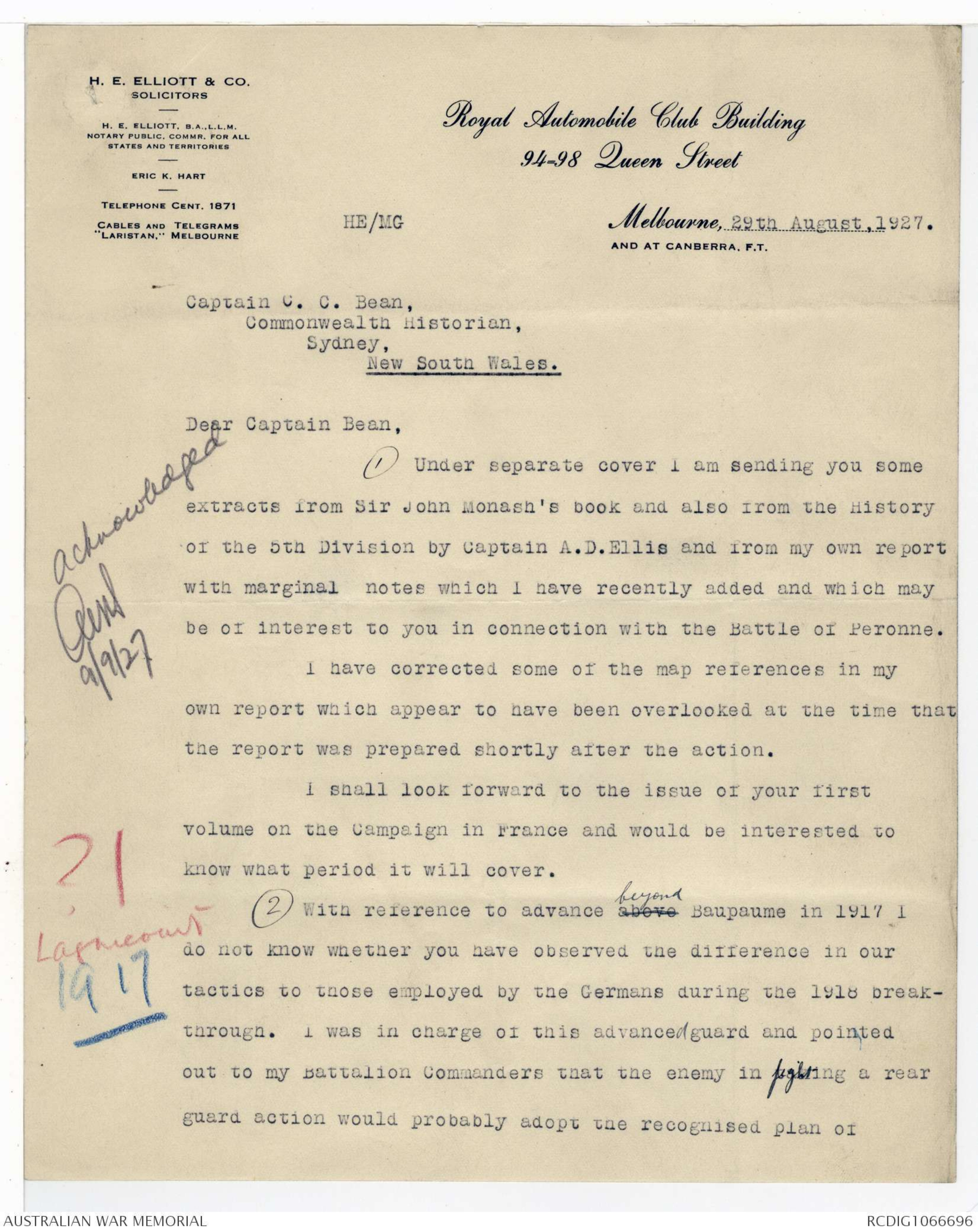
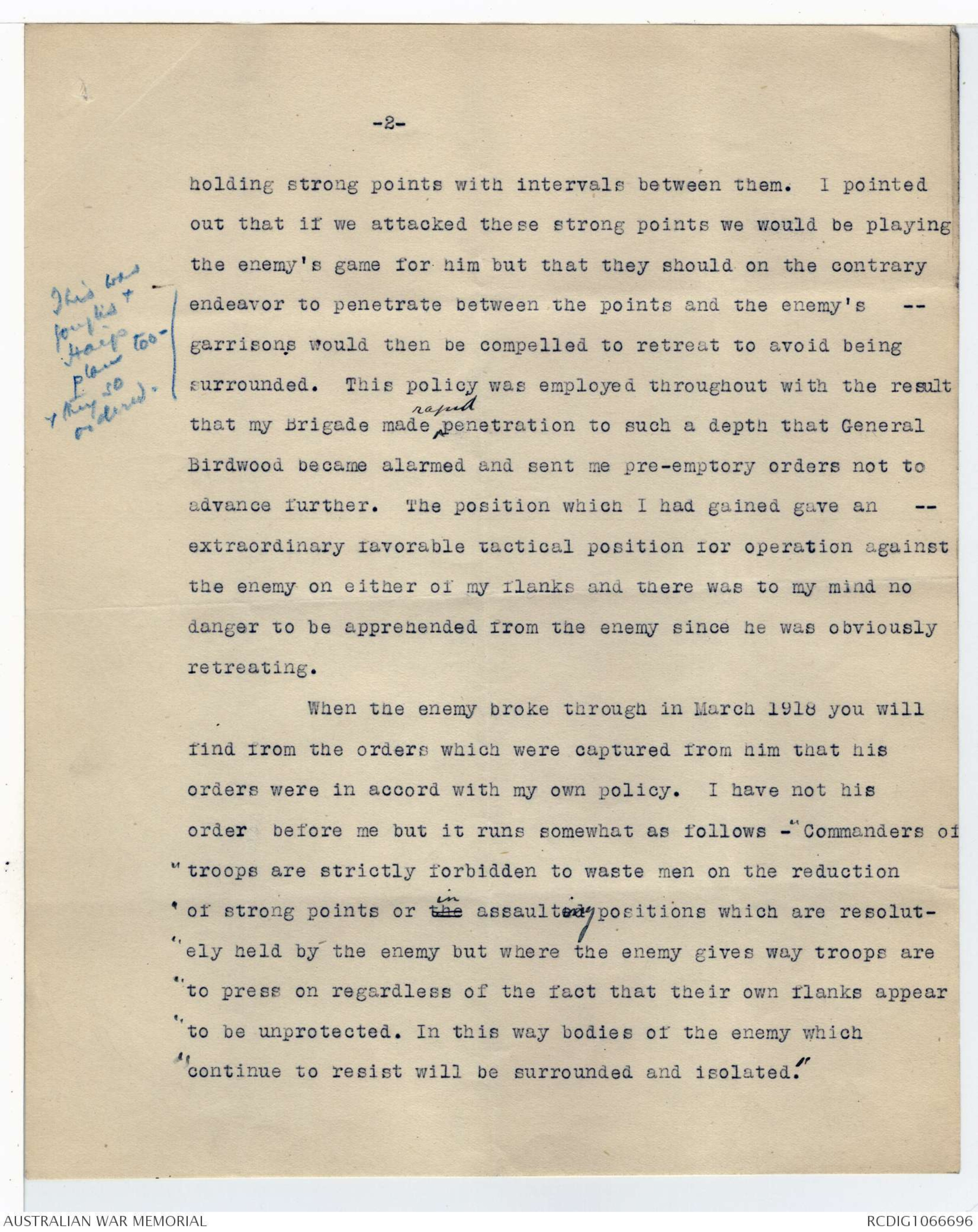
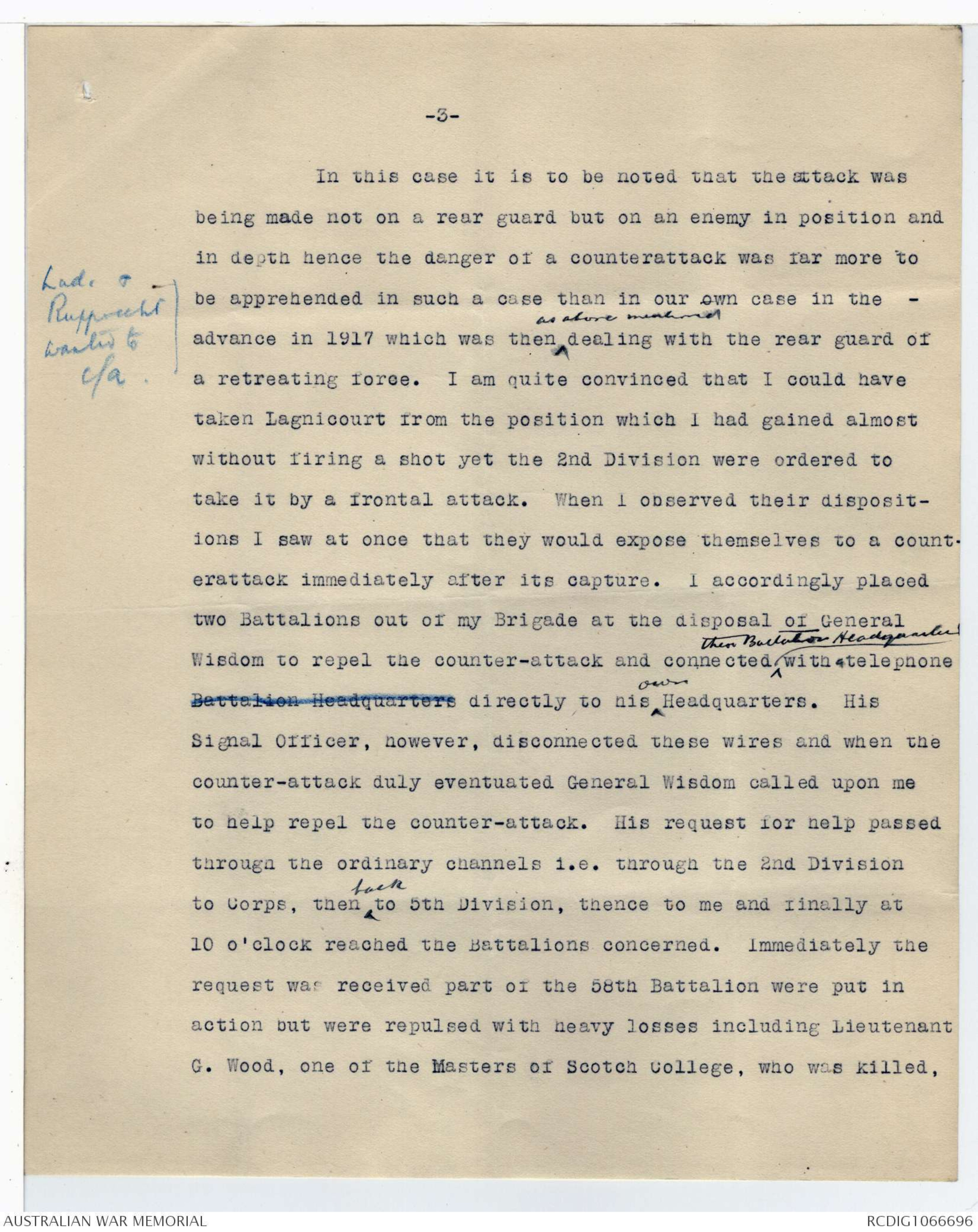
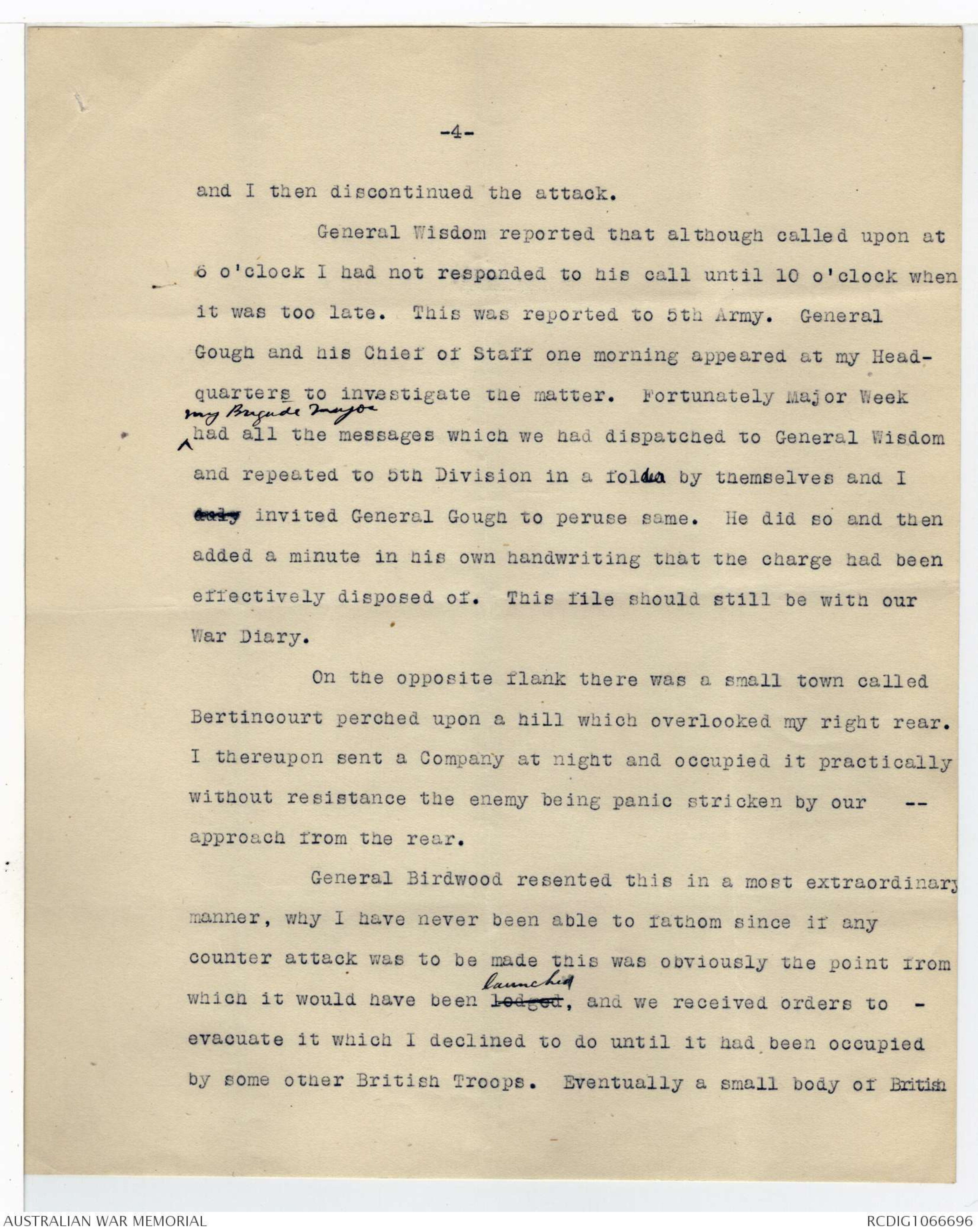
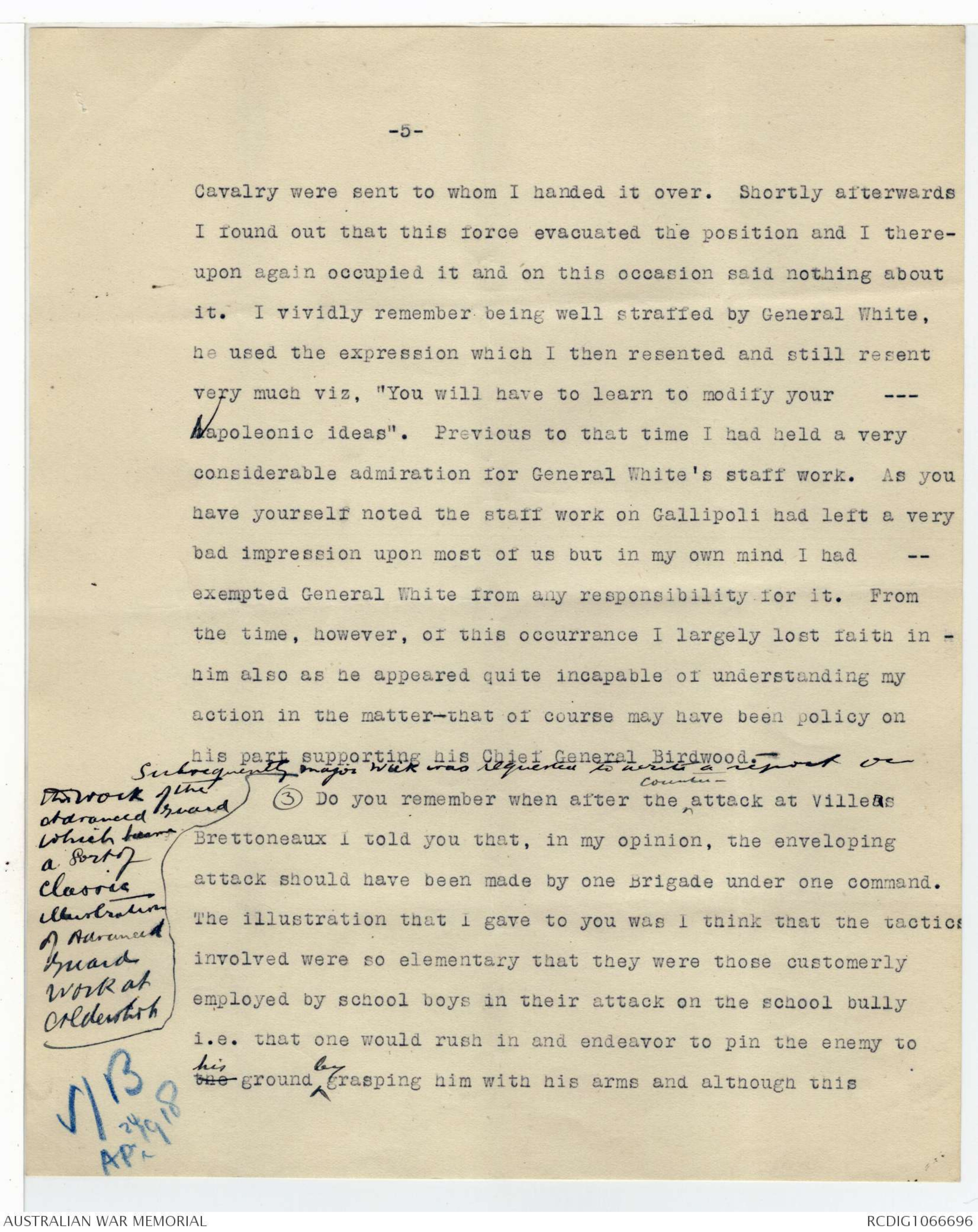
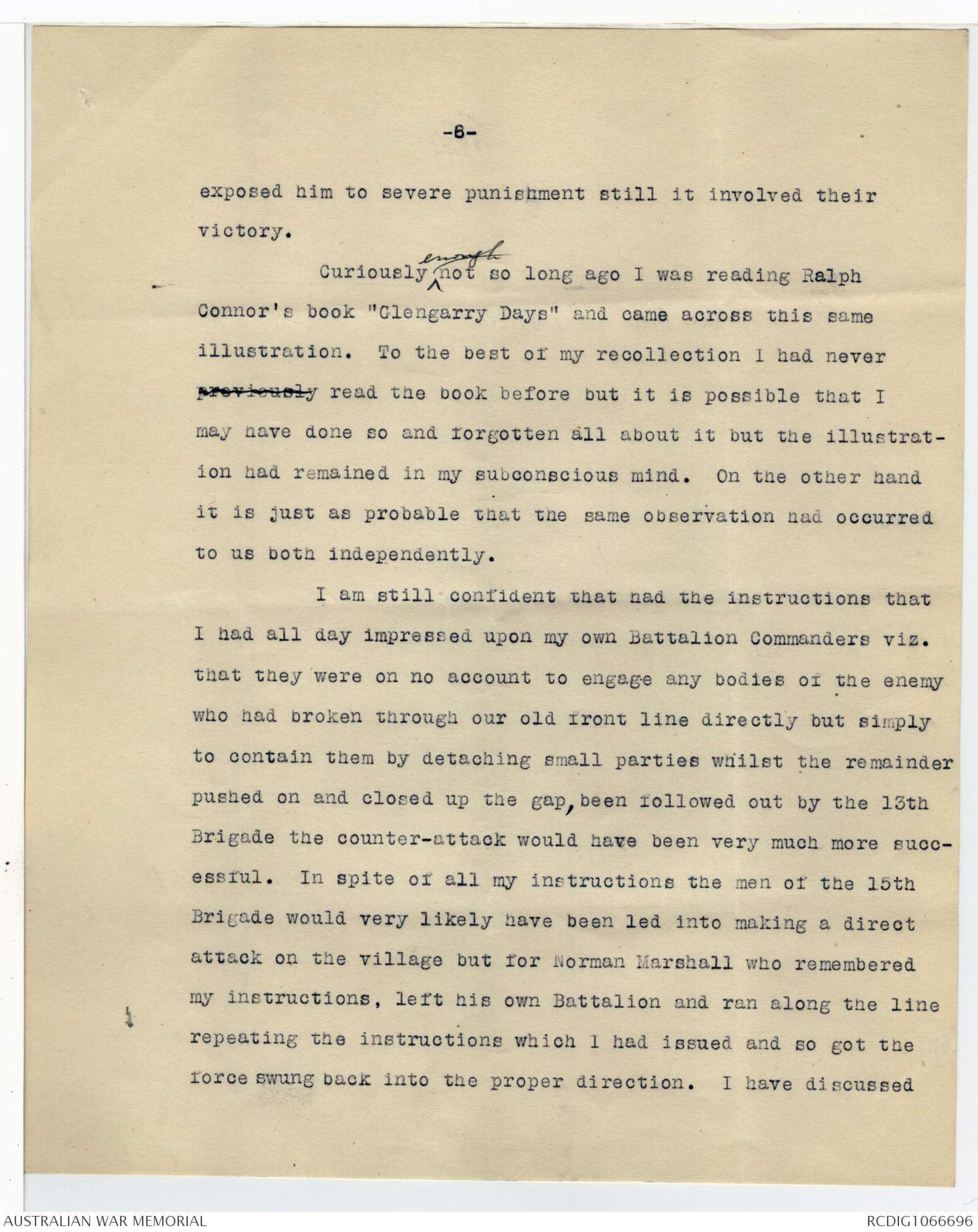
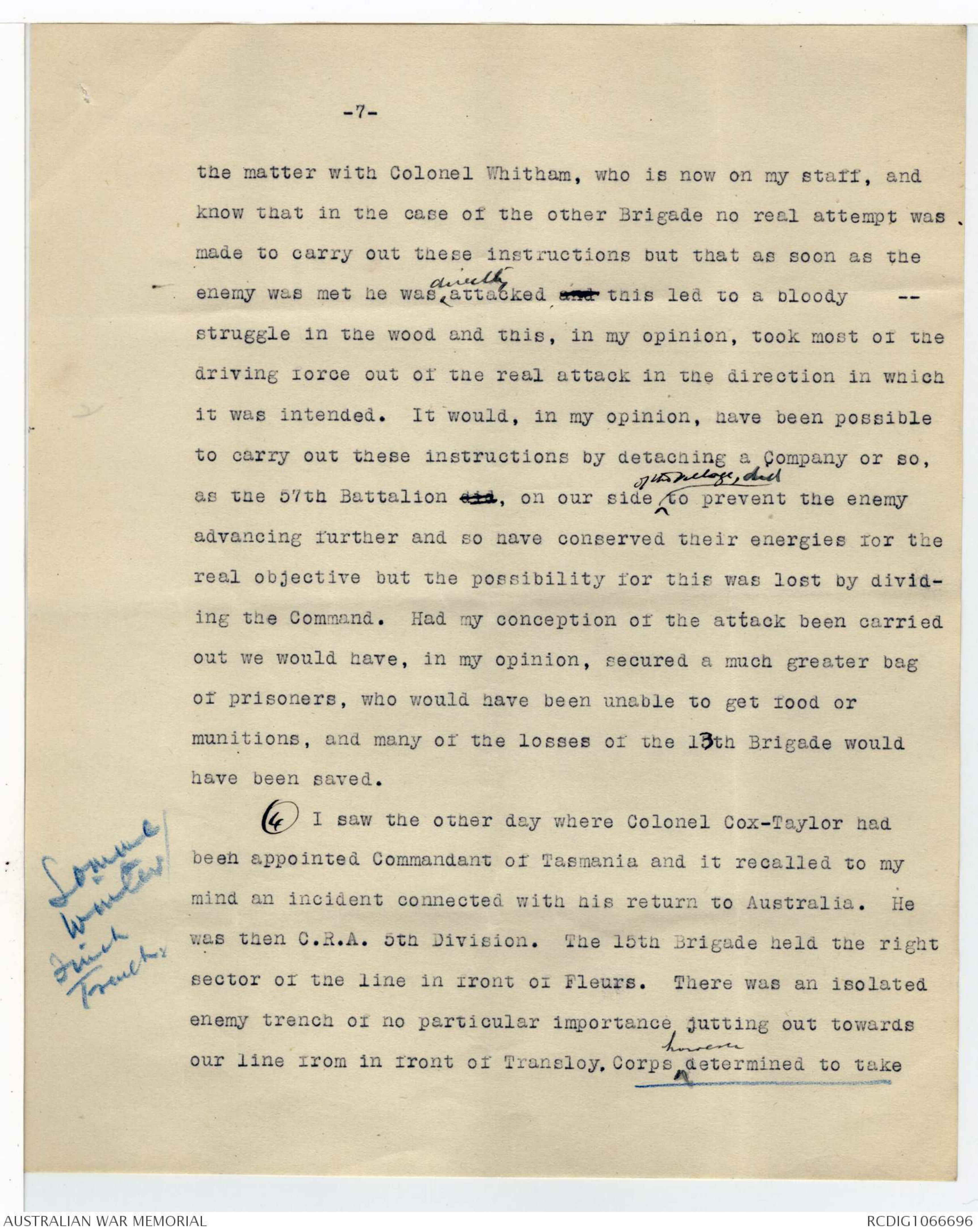
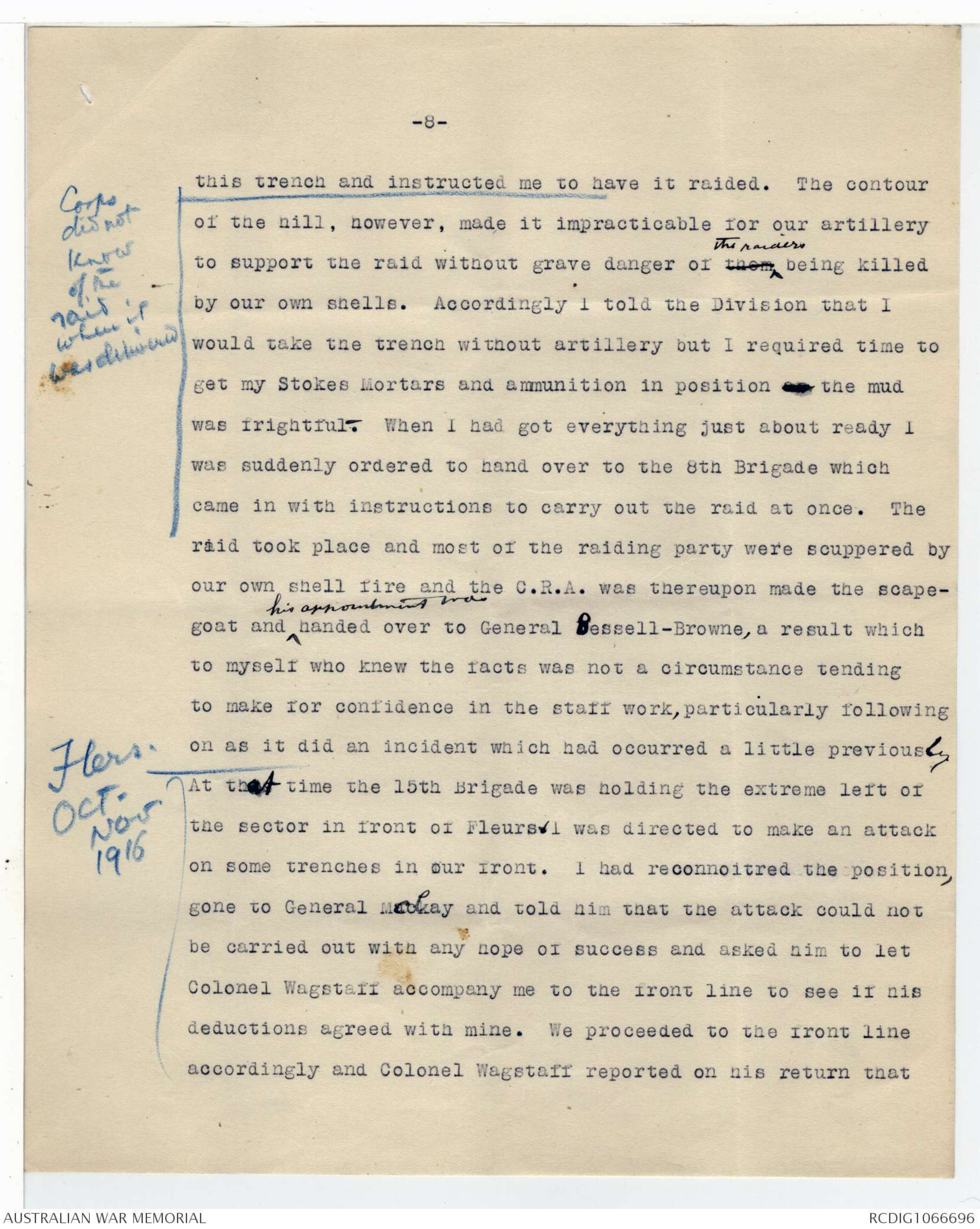
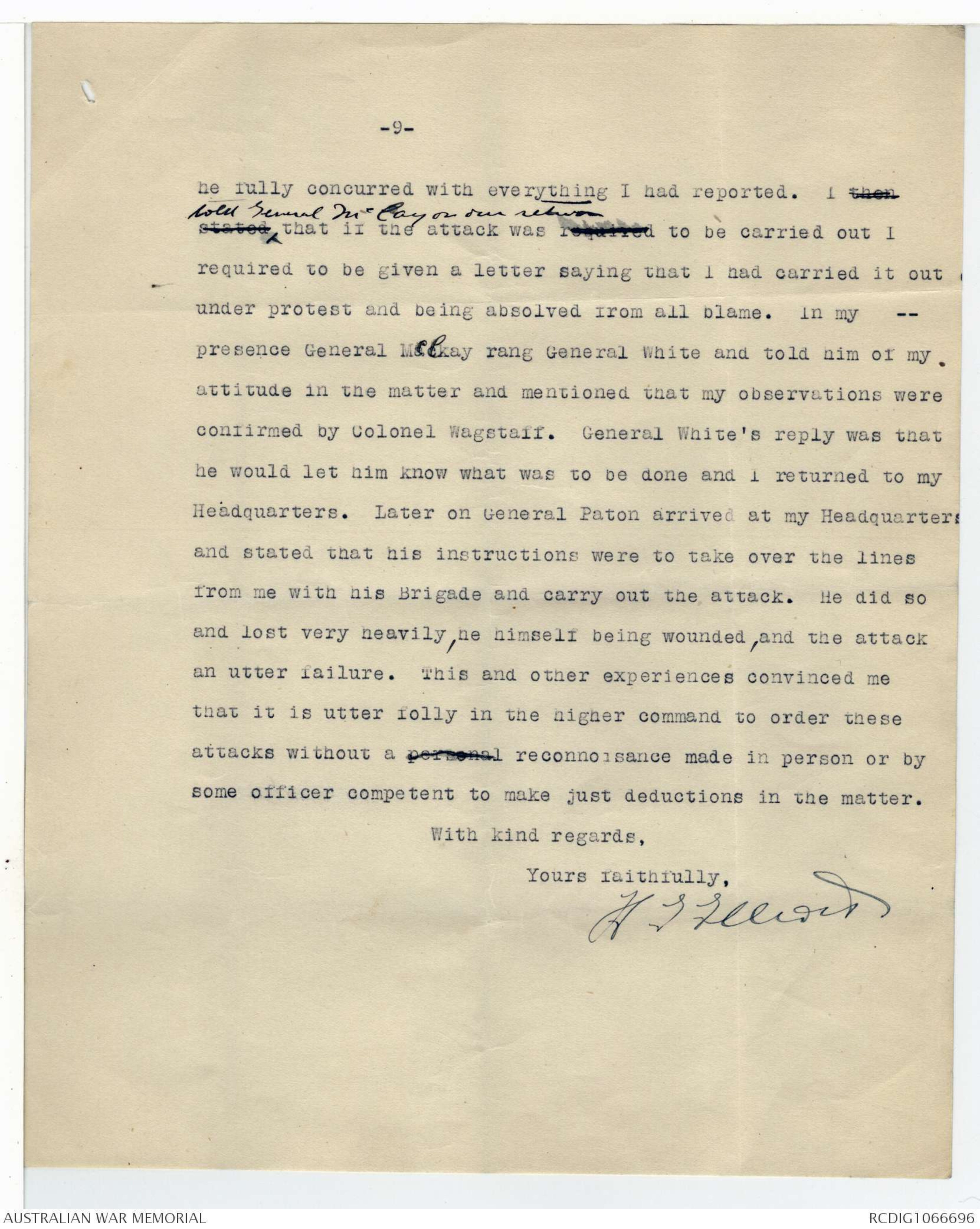
Captain C. Bean. 24/8/29
May I take this opportunity of congratulating
you on your last volume. It must be a stupendous undertaking,
and a very difficult one, but I have heard nothing but
favourable criticism of your work.
With very kind regards.
I am,
Yours sincerely,
J. Talbot Hobbs.
H.E. ELLIOTT & CO.
SOLICITORS
____
H. E. ELLIOTT, B. A., L. L. M.
NOTARY PUBLIC, COMMR. FOR ALL
STATES AND TERRITORIES
____
ERIC K. HART
_____
TELEPHONE CENT. 1871
CABLES AND TELEGRAMS
"LARISTAN," MELBOURNE
Royal Automobile Club Building
94-98 Queen Street
Melbourne, 29th August, 1927.
AND AT CANBERRA. F.T.
HE/MG
Captain C. C. Bean
Commonwealth Historian,
Sydney,
New South Wales.
Dear Captain Bean
(1) Under separate cover I am sending you some
extracts from Sir John Monash's book and also from the History
of the 5th Division by Captain A.D.Ellis and from my own report
with marginal notes which I have recently added and which may
be of interest to you in connection with the Battle of Peronne.
[*acknowledged
CMS
9/9/27*]
I have corrected some of the map references in my
own report which appear to have been overlooked at the time that
the report was prepared shortly after the action.
I shall look forward to the issue of your first
volume on the Campaign in France and would be interested to
know what period it will cover.
(2) With reference to advance above ^beyond Baupaume in 1917 I
do not know whether you have observed the difference in our
tactics to those employed by the Germans during the 1918 breakthrough.
I was in charge of this advanced guard and pointed
out to my Battalion Commanders that the enemy in fighting a rear
guard action would probably adopt the recognised plan of
[*21
Lagnicourt
1917*]
-2-
holding strong points with intervals between them. I pointed
out that if we attacked these strong points we would be playing
the enemy's game for him but that they should on the contrary
endeavour to penetrate between the points and the enemy's --
garrisons would then be compelled to retreat to avoid being
surrounded. This policy was employed throughout with the result
that my Brigade made ^rapid penetration to such a depth that General
Birdwood became alarmed and sent me pre-emptory orders not to
advance further. The position which I had gained gave an --
extraordinary favorable tactical position for operation against
the enemy on either of my flanks and there was to my mind no
danger to be apprehended from the enemy since he was obviously
retreating.
[*This was
Gough's &
Haigs
plan too -
& they so
ordered.*]
When the enemy broke through in March 1918 you will
find from the orders which were captured from him that his
orders were in accord with my own policy. I have not his
order, before me but it runs somewhat as follows - "Commanders of
"troops are strictly forbidden to waste men on the reduction
"of strong points or the ^in assaulting positions which are resolutely
"held by the enemy but where the enemy gives way troops are
"to press on regardless of the fact that their own flanks appear
"to be unprotected. In this way bodies of the enemy which
"continue to resist will be surrounded and isolated".
-3-
In this case it is to be noted that the attack was
being made not on a rear guard but on an enemy in position and
in depth hence the danger of a counterattack was far more to
[* Lad, &
Ruppreccht
wanted to
c/a *]
be apprehended in such a case than in our own case in the -
advance in 1917 which was then ^ as above mentioned dealing with the rear guard of
a retreating force. I am quite convinced that I could have
taken Lagnicourt from the position which I had gained almost
without firing a shot yet the 2nd Division were ordered to
take it by a frontal attack. When I observed their dispositions
I saw at once that they would expose themselves to a counterattack
immediately after its capture. I accordingly placed
two Battalions out of my Brigade at the disposal of General
Wisdom to repel the counter-attack and connected ^then Battalion Headquarters with a telephoneBattalionHeadquarters directly to his ^own Headquarters. His
Signal Officer, however, disconnected these wires and when the
counter-attack duly eventuated General Wisdom called upon me
to help repel the counter-attack. His request for help passed
through the ordinary channels i.e. through the 2nd Division
to Corps, then, ^back to 5th Division, thence to me and finally at
10 o'clock reached the Battalions concerned. Immediately the
request was received part of the 58th Battalion were put in
action but were repulsed with heavy losses including Lieutenant
G. Wood, one of the Masters of Scotch college, who was killed,
-4-
and I then discontinued the attack.
General Wisdom reported that although called upon at
6 o'clock I had not responded to his call until 10 o'clock when
it was too late. This was reported to 5th Army. General
Gough and his Chief of Staff one morning appeared at my Headquarters
to investigate the matter. Fortunately Major Week
^my Brigade Major had all the messages which we had dispatched to General Wisdom
and repeated to 5th Division in a folder by themselves and Iduly invited General Gough to peruse same. He did so and then
added a minute in his own handwriting that the charge had been
effectively disposed of. This file should still be with our
War Diary.
On the opposite flank there was a small town called
Bertincourt perched upon a hill which overlooked my right rear.
I thereupon sent a Company at night and occupied it practically
without resistance the enemy being panic stricken by our --
approach from the rear.
General Birdwood resented this in a most extraordinary
manner, why I have never been able to fathom since if any
counter attack was to be made this was obviously the point from
which it would have been ledged launched, and we received orders to -
evacuate it which I declined to do until it had been occupied
by some other British Troops. Eventually a small body of British
-5-
Cavalry were sent to whom I handed it over. Shortly afterwards
I found out that this force evacuated the position and I thereupon
again occupied it and on this occasion said nothing about
it. I vividly remember being well straffed by General White,
he used the expression which I then resented and still resent
very much viz, "You will have to learn to modify your ---
Napoleonic ideas". Previous to that time I had held a very
considerable admiration for General White's staff work. As you
have yourself noted the staff work on Gallipoli had left a very
bad impression upon most of us but in my own mind I had --
exempted General White from any responsibility for it. From
the time, however, of this occurrance I largely lost faith in -
him also as he appeared quite incapable of understanding my
action in the matter-that of course may have been policy on
his part supporting his Chief General Birdwood. -
[*Subsequently Major Wicks was required to write a report on
this work of the Advance Guard which forms a sort of classic
illustration of Advance Guard work at Aldershot *]
(3) Do you remember when after the ^ counter attack at Villers
Brettoneaux I told you that, in my opinion, the enveloping
attack should have been made by one Brigade under one command.
The illustration that I gave to you was I think that the tactics
involved were so elementary that they were those customerly
employed by school boys in their attack on the school bully
i.e. that one would rush in and endeavor to pin the enemy tothe his ground ^by grasping him with his arms and although this
[*V/B
Ap 24 1918*]
-6-
exposed him to severe punishment still it involved their
victory.
Curiously ^enough not so long ago I was reading Ralph
Connor's book "Glengarry Days" and came across this same
illustration. To the best of my recollection I had neverpreviously read the book before but it is possible that I
may have done so and forgotten all about it but the illustration
had remained in my subconscious mind. On the other hand
it is just as probable that the same observation had occurred
to us both independently.
I am still confident that had the instructions that
I had all day impressed upon my own Battalion Commanders viz.
that they were on no account to engage any bodies of the enemy
who had broken through our old front line directly but simply
to contain them by detaching small parties whilst the remainder
pushed on and closed up the gap,been followed out by the 13th
Brigade the counter-attack would have been very much more successful.
In spite of all my instructions the men of the 15th
Brigade would very likely have been led into making a direct
attack on the village but for Norman Marshall who remembered
my instructions, left his own Battalion and ran along the line
repeating the instructions which I had issued and so got the
force swung back into the proper direction. I have discussed
-7-
the matter with Colonel Whitham, who is now on my staff, and
know that in the case of the other Brigade no real attempt was
made to carry out these instructions but that as soon as the
enemy was met he was ^directly, attacked and this led to a bloody --
struggle in the wood and this, in my opinion, took most of the
driving force out of the real attack in the direction in which
it was intended. It would, in my opinion, have been possible
to carry out these instructions by detaching a Company or so,
as the 57th Battalion did, on our side ^of the village, did to prevent the enemy
advancing further and so have conserved their energies for the
real objective but the possibility for this was lost by dividing
the Command. Had my conception of the attack been carried
out we would have, in my opinion, secured a much greater bag
of prisoners, who would have been unable to get food or
munitions, and many of the losses of the 13th Brigade would
have been saved.
[*Somme winter
Finch Trench*]
(4) I saw the other day where Colonel Cox-Taylor had
been appointed Commandant of Tasmania and it recalled to my
mind an incident connected with his return to Australia. He
was then C.R.A. 5th Division. The 15th Brigade held the right
sector of the line in front of Fleurs. There was an isolated
enemy trench of no particular importance jutting out towards
our line from in front of Transloy .Corps ^ however determined to take
-8-
this trench and instructed me to have it raided. The contour
[*Corps did not know of the raid where it was delivered*]
of the hill, however, made it impracticable for our artillery
to support the raid without grave danger of them the raiders being killed
by our own shells. Accordingly I told the Division that I
would take the trench without artillery but I required time to
get my Stokes Mortars and ammunition in position as the mud
was frightful. When I had got everything just about ready I
was suddenly ordered to hand over to the 8th Brigade which
came in with instructions to carry out the raid at once. The
raid took place and most of the raiding party were scuppered by
our own shell fire and the C.R.A. was thereupon made the scapegoat
and ^his appointment was handed over to General Bessell-Browne, a result which
to myself who knew the facts was not a circumstance tending
to make for confidence in the staff work, particularly following
on as it did an incident which had occurred a little previously
[*Flers.
Oct-Nov 1916*]
At that time the 15th Brigade was holding the extreme left or
the sector in front of Fleurs & l was directed to make an attack
on some trenches in our front. I had reconnoitred the position,
gone to General McCay and told him that the attack could not
be carried out with any nope of success and asked him to let
Colonel Wagstaff accompany me to the front line to see if his
deductions agreed with mine. We proceeded to the front line
accordingly and Colonel Wagstaff reported on his return that
-9-
he fully concurred with everything I had reported. I thenstated told General McCay on our return that if the attack was required to be carried it out I
required to be given a letter saying that I had carried it out
under protest and being absolved from all blame. In my --
presence General McCay rang General White and told him of my.
attitude in the matter and mentioned that my observations were
confirmed by Colonel Wagstaff. General White's reply was that
he would let him know what was to be done and I returned to my
Headquarters. Later on General Paton arrived at my Headquarters
and stated that his instructions were to take over the lines
from me with his Brigade and carry out the attack. He did so
and lost very heavily, he himself being wounded, and the attack
an utter failure. This and other experiences convinced me
that it is utter folly in the higher command to order these
attacks without a personal reconnaissance made in person or by
some officer competent to make just deductions in the matter.
With kind regards,
Yours faithfully,
H E ELLIOTT
 Sandy Mudie
Sandy MudieThis transcription item is now locked to you for editing. To release the lock either Save your changes or Cancel.
This lock will be automatically released after 60 minutes of inactivity.